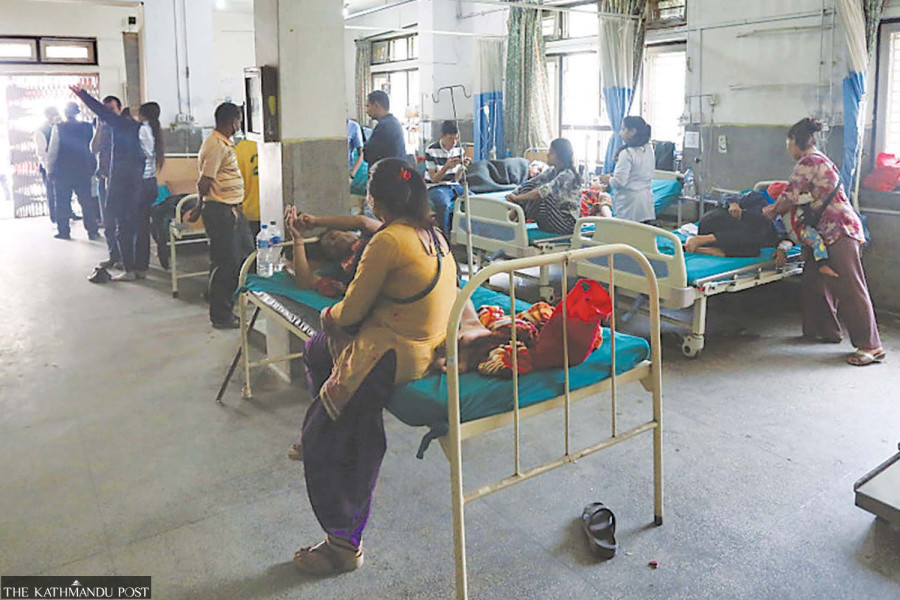Health
Blood bank asked to be prepared for repeat of last year’s dengue epidemic
As many as 74 districts of the country have reported an outbreak of the viral disease.
Arjun Poudel
As the spread of the dengue virus continues unabated across the country, the Central Blood Transfusion Service, also known as the blood bank, has been alerted to the risk of a massive spread of the deadly disease in the coming days.
The demand for platelet-rich plasma and platelet concentrate will rise manifold if the cases of dengue infection rise and so will the hospitalisations with the severity of the disease in the infected patients increasing.
“We have been alerted by the Ministry of Home Affairs and the Ministry of Health and Population to a possible risk of massive spread of the virus in the coming days,” said Sanjeev Kumar Yadav, senior technical officer at the blood bank. “So far, the demand for blood components for dengue patients has not risen, but if the cases rise continuously, the demand will grow.”
Last year, during the dengue epidemic’s peak time, blood banks in the Kathmandu valley faced an acute crisis of blood components. The blood bank had appealed to organisations and individuals for blood donation to meet the growing demand.
The blood bank says 400 pints of blood is in demand in the Valley every day, but collections are only 150 to 200 pints. Last year, at the peak of the dengue outbreak, the demand had grown to over 600 pints.
According to Subash Singh, an official at the blood bank at the BP Koirala Institute of Health Sciences, there is no dearth of blood for infected patients in Dharan.
Of the 77 districts of the country, 74 have reported cases of infection from dengue virus. At least eight persons have succumbed to the disease and 9,411 people have been infected since the start of 2023, according to the Epidemiology and Disease Control Division. But the number of deaths and infections reported in the official figures are far less than real numbers as all cases of infection and deaths are not reported.
Officials say a majority of the cases were reported in July. Sunsari, Morang and Dhading are the three districts mostly affected by the virus. Sunsari, which is the epicentre of the virus outbreak, recorded 5,041 cases.
Due to the high inflow of infected patients, the BP Koirala Institute of Health Sciences has been overwhelmed. The hospital administration has been treating the seriously ailing patients on the floor. According to the hospital administration, beds in the hospital’s emergency ward, Covid ward, observation wards and several other departments are all filled with dengue patients. Dozens of patients with serious complications have been visiting hospitals for treatment every day.
The hospital has converted its 100-bed Covid treatment facility into a dengue ward. A special dengue clinic has been brought into operation after the hospital’s outpatient department was overwhelmed with dengue patients. Several doctors, nurses, paramedics and other hospital staff have also been infected with dengue and this has affected service delivery.
Morang district has reported 1,228 cases of dengue so far.
“Serotype-1 (DENV-1), Serotype-2 (DENV-2), and Serotype-3 (DENV-3) of the dengue virus have been found responsible for the current spread of the infections,” said Dr Gokarna Dahal, chief of the vector control section, at the division.
There are five serotypes of dengue, numbered 1 through 5.
The National Public Health Laboratory and BP Koirala Institute of Health Sciences carried out serotyping of the virus on the clinical samples of the infected persons a few days ago.
Health ministry officials said all concerned agencies have been alerted to the risk of a massive spread of the dengue virus, as the post-monsoon season is yet to come.
The post-monsoon time is considered the peak season for dengue transmissions, but the country has witnessed outbreaks of the potentially deadly disease since the start of the year. Experts say the virus has become endemic with cases of dengue being reported throughout the year.
“Without active participation of all people and agencies, it is not possible to contain the proliferation of the dengue-spreading mosquito, which means the dengue virus will spread continuously, ” said Dr Samir Kumar Adhikari, joint-spokesperson for the Health Ministry. “We have requested all the agencies and people concerned for help to destroy mosquito breeding grounds.”
Dengue is a mosquito-borne disease transmitted by female Aedes aegypti and Aedes albopictus mosquitoes. The same vector also transmits chikungunya, yellow fever, and Zika, according to the World Health Organisation.
Last year, 88 persons died and more than 54,000 were infected with the virus, which had spread to all the districts of the country. Hospitals in Kathmandu Valley were overwhelmed with dengue patients and many complained that they were deprived of treatment. At the time, pharmacies had run out of paracetamol, the most-widely used medicine to treat fever.
Experts say unless the lessons and experiences gained during the previous outbreaks are implemented, the disease will not stop spreading. They say the real number of infections could be several times higher, as the government’s case reporting system is not very effective and more than 80 percent of the cases are asymptomatic. Many people infected with dengue show mild symptoms, which do not need any treatment or can be treated with paracetamol at home.
The dengue-transmitting mosquitoes breed in clean water and bite people in daylight. Uncovered water tanks and discarded objects such as plastic cups and bottles could be breeding grounds for dengue-carrying mosquitoes.
According to doctors, mild to high fever, severe muscle pain, rashes, severe headache and pain in the eyes are some of the symptoms of dengue. Doctors advise those with these symptoms to seek immediate treatment. While there is no specific cure for the disease, early detection and access to proper medical care can lower fatalities.




 9.83°C Kathmandu
9.83°C Kathmandu















